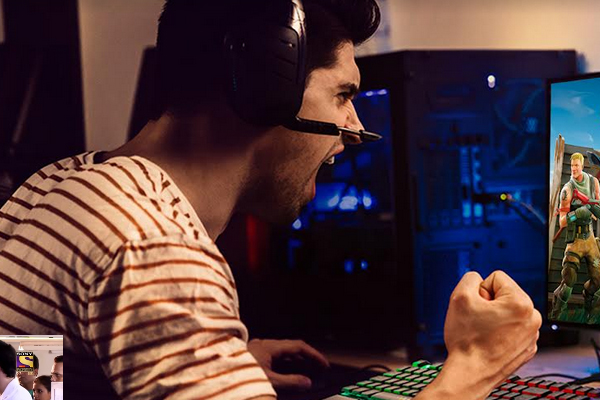1 of 1 parts
Blanket Ban on Online Gaming or Progressive Regulation!
By: Team Aapkisaheli | Posted: 06 Dec, 2021

Can Full Prohibition Solve Gambling-Related Problems?
So, should the state really ban online gaming in India? Should the government be telling adults what to do and what not to do when such people are not harming anyone else and minding their own business? Should governments interfere with peoples lives? These and more questions are asked by Dr Jaijit Bhattacharya, the President of the Centre for Digital Economy Policy Research in a recently published opinion article on the issue of online gaming regulation.
Governments are easily moved by reports of ruined lives or families, sometimes even suicides, caused by the lure of online gambling that is just a few clicks away, anytime and anywhere. As a responsible government, one has to address the situation, points out Dr Bhattacharya. The easiest solution seems to be the simple prohibition on online gaming, but international or national regulation might be the better option.
Consumer Protection is Key for Existing International Licenses
Consumer protection and requirements on responsible gaming policies are key aspects of existing international or offshore gambling licenses, as is explained by industry experts ENV Media (Esse N Videri) in a recent analytical paper. Any other matters of concern to public authorities or customers like payment security, operator integrity, and adherence to anti-money laundering rules are also important, as such regulators strive to maintain their reputation intact.
A good example are the permits issued by the Malta Gaming Authority (MGA) which are deemed first-class international licenses that can be used for slots, poker, roulette, online lottery and other digital gambling or casino games. The legal framework behind the MGA licenses was updated in 2018 with focus on responsible gaming and anti-money laundering policies, and also to provide more flexibility on new gaming products in view of fast technological developments.
Progressive National Legislation Can Do Even Better
A national regulation on online gambling would provide the government with even more control options over the sector, as well as a new source of taxation and other revenues, point out the ENV Media analysts. A common practice is the establishment of a dedicated agency or body specialized in the issuing of licenses and monitoring the gaming environment to be as has been envisaged by the legislator and the expectations of society.
Local and foreign operators alike will have to pay taxes and obey the local laws, including policies on consumer protection and responsible gambling, data security and privacy. Gaming platforms can be required to notify users about their status, deposited sums, hours of playing, winnings and loses, as well as to provide links to professional help on problem gambling and advice relating to self-limitation and exclusion mechanisms.
The Story of the Pioneering Blanket Ban on Video Gaming - the Philippines
Discussing prohibitions, Dr Bhattacharya brings up the leading example of the Philippines, where president Ferdinand Marcos issued a decree with the first prohibition on video gaming in the world on November 19, 1981. In July 2016, the newly elected president Rodrigo Duterte announced a move to halt the spread of online gambling in the country and to revoke the existing licenses. However, president Duterte quickly changed his position and proceeded to regulate online gaming, earning substantial revenues for the country’s exchequer and, some years later, geopolitical problems. The countrys big neighbour China was quite unhappy with the spread on its territory of gaming apps based on the Philippines, but Duterte didnot succumb because a ban on online games would have seriously impacted the economy in a negative way. Eventually, it was concerns over the Philippines’ internet infrastructure being overwhelmed by the live streaming of online games that brought their prohibition in April 2021, nothing to do with worries about alleged harm inflicted to the youth or adult population.
Bans Cannot Work if Struck Down as Unconstitutional
Karnataka Advocate General Prabhuling K Navadgi is personally defending before the Karnataka High Court the states amendments to the Police Act of 1963 that banned all online gaming including games of skill when stakes are involved.
The amendment bill came into force upon its notification on October 5 and was immediately challenged by skill gaming industry body All India Gaming Federation (AIGF) and several companies from the sector. They argue that the ban on games of skill is unconstitutional and exceeds the powers granted to the state legislature.
In September, the Kerala High Court struck down an amendment to the states Gaming Act banning online rummy when played for stakes. The HC observed that the Supreme Court had already held that rummy was a game of mere skill and playing for stakes or not can never be a criterion to find out whether a game is a game of skill.
Similarly, in August, the Madras HC declared invalid the amendment to the Tamil Nadu Gaming and Police Laws banning online betting games as ultra vires to the Constitution and excessive and disproportionate to its object.
Several other HC judgements on PIL cases seeking ban on online fantasy sports, including orders by the High Courts of Bombay, Rajasthan, and Punjab and Haryana, backed up by consequent rulings of the Supreme Court, have held the status of skill games as protected by the Constitution under the fundamental right to practise any profession or to carry out any occupation, trade or business.
#बॉलीवुड डीवाज के फेवराइट बने झुमके
 Parenting Tips: सर्दियों में बच्चों के साथ कर रही हैं ट्रैवल, तो इन चीजों को रखें साथ
Parenting Tips: सर्दियों में बच्चों के साथ कर रही हैं ट्रैवल, तो इन चीजों को रखें साथ शरीर से बदबू दूर करने के लिए नहीं पड़ेगी महंगे परफ्यूम की जरूरत, इस तरह बढ़ाएं खुशबू
शरीर से बदबू दूर करने के लिए नहीं पड़ेगी महंगे परफ्यूम की जरूरत, इस तरह बढ़ाएं खुशबू Safety Tips: घने कोहरे में करें सेफ ड्राइविंग, इन सेफ्टी टिप्स का रखें ध्यान
Safety Tips: घने कोहरे में करें सेफ ड्राइविंग, इन सेफ्टी टिप्स का रखें ध्यान  इस तरह करें गंदे स्विच बोर्ड की साफ सफाई, बिल्कुल नहीं लगेगा करंट
इस तरह करें गंदे स्विच बोर्ड की साफ सफाई, बिल्कुल नहीं लगेगा करंट Parenting Tips: बच्चों की स्टडी के लिए बनाएं टाइम मैनेजमेंट, पढ़ाई में लगेगा मन
Parenting Tips: बच्चों की स्टडी के लिए बनाएं टाइम मैनेजमेंट, पढ़ाई में लगेगा मन 80 दशक से अब तक फिल्म इंडस्ट्री में क्या-क्या आए बदलाव! माधुरी दीक्षित ने खुलकर की बात
80 दशक से अब तक फिल्म इंडस्ट्री में क्या-क्या आए बदलाव! माधुरी दीक्षित ने खुलकर की बात
Mixed Bag
 शरीर में पित्त बढ़ने का संकेत है बार-बार मुंह में हो रहे छाले, अनदेखा करना पड़ सकता है भारी
शरीर में पित्त बढ़ने का संकेत है बार-बार मुंह में हो रहे छाले, अनदेखा करना पड़ सकता है भारी
बार-बार मुंह में हो रहे छाले सामान्य बात नहीं है, क्योंकि यह खराब पाचन का संकेत है। खराब पाचन पेट के साथ-साथ मुंह, आंत, लिवर समेत कई अंगों को प्रभावित करता है। आयुर्वेद ने मुंह के छालों को पित्त से जोड़ा है। शरीर में पित्त बढ़ने से छाले होते हैं और अगर स्थिति गंभीर है तो यही मुंह के छाले श्वास नली तक पहुंच जाते हैं और पेट में अल्सर की परेशानी भी हो सकती है। इसके अलावा, पेट की गर्मी, विटामिन B12 की कमी, कब्ज, ज्यादा मसालेदार भोजन और मुंह में संक्रमण की वजह से भी छाले हो सकते हैं।... Relationship Tips: रिश्ते को लंबा चलाने के लिए ध्यान रखें ये बाते, हमेशा रहेंगे एक दूसरे के करीब
Relationship Tips: रिश्ते को लंबा चलाने के लिए ध्यान रखें ये बाते, हमेशा रहेंगे एक दूसरे के करीब
रिलेशनशिप चलाने के लिए दोनों ही पार्टनर को यह समझने की जरूरत है कि दोनों पक्षों को प्रयास और समझौता करना पड़ता है। अगर...... शरीर को सर्वाइवल मोड में डाल देती है नींद की कमी, दिमाग लेने लगता है माइक्रो-स्लीप
शरीर को सर्वाइवल मोड में डाल देती है नींद की कमी, दिमाग लेने लगता है माइक्रो-स्लीप
सेलिब्रिटी न्यूट्रिशनिस्ट पूजा मखीजा ने बताया कि नींद की कमी शरीर को सर्वाइवल मोड में डाल देती है, जहां बायोलॉजी खुद कंट्रोल ले लेती है। उन्होंने बताया कि शरीर कैलेंडर या व्यस्तता का इंतजार नहीं करता। कम नींद आने पर वह स्ट्रेस सर्वाइवल मोड में चला जाता है, जहां बायोलॉजी कंट्रोल ले लेती है। कम नींद से दिमाग माइक्रो-स्लीप लेने लगता है। इसमें आंखें खुली रहते हुए 3-15 सेकंड के छोटे झपकी, जो सुरक्षा के लिए होती है। एक रात की कम नींद से कोर्टिसोल (स्ट्रेस हार्मोन) 37 प्रतिशत बढ़ जाता है, जिससे पेट की चर्बी, भूख, चिंता और इंसुलिन रेजिस्टेंस बढ़ती है।... Beauty Care: आइब्रो से बढ़ती है चेहरे की खूबसूरती, सही पोषण से आता है घनापन
Beauty Care: आइब्रो से बढ़ती है चेहरे की खूबसूरती, सही पोषण से आता है घनापन
आयुर्वेद में नारियल तेल को भौहों के लिए एक सरल लेकिन प्रभावी उपाय माना गया है। नारियल तेल को आयुर्वेद में केश वर्धक यानी बालों की वृद्धि बढ़ाने वाला बताया गया है। यह तेल ठंडा होता है, जो त्वचा के ज्वलन को शांत करता है और बालों की जड़ों को मजबूत बनाता है। जब नारियल तेल आइब्रो पर लगाया जाता है, तो यह धीरे-धीरे त्वचा के अंदर समाकर बालों की जड़ों तक पहुंचता है। वहां यह सूखी और कमजोर जड़ों को नमी देता है, जिससे नई ग्रोथ के लिए सही माहौल बनता है।...
News
ट्विंकल खन्ना ने फिल्मों से किनारे होने पर कभी नहीं किया अफसोस
- बॉलीवुड में मौके खोने का था डर, इसलिए त्रिधा चौधरी ने हॉलीवुड प्रोजेक्ट से बनाई दूरी
- स्मृति और शेफाली ने जैसी शुरुआत दी, उसके लिए उन्हें श्रेय देना चाहिए : हरमनप्रीत कौर
- ओटीटी ने विकल्प दिए, लेकिन इसका मतलब यह नहीं कि थिएटर का समय खत्म हो गया : माधुरी दीक्षित
- भारत ने रचा इतिहास, महिला टी 20 अंतरराष्ट्रीय क्रिकेट का अपना सबसे बड़ा स्कोर बनाया
- भारत बनाम श्रीलंका: लगातार तीसरे टी 20 मैच में शेफाली वर्मा का अर्धशतक, इस लिस्ट में बनाई जगह
- बीएमसी चुनाव जीतेंगे, महायुति से बनेगा मराठी मेयर : शायना एनसी
